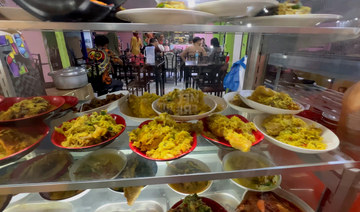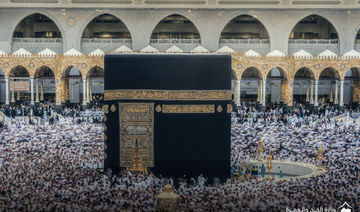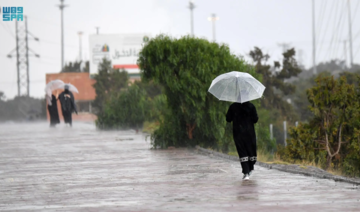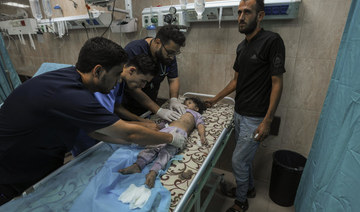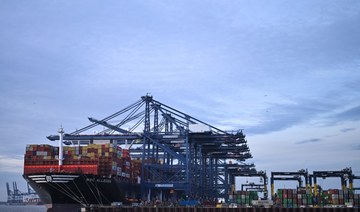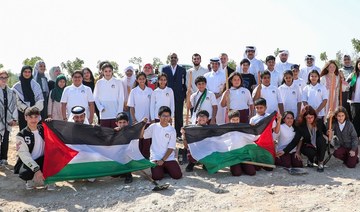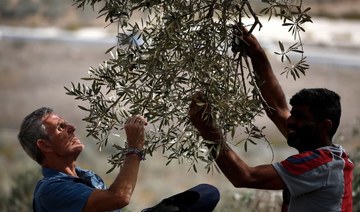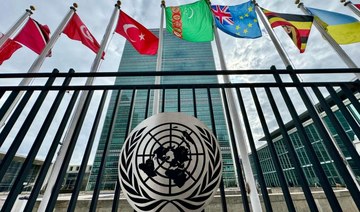TAJURA, Libya: Dressed in tracksuits with their sleeves rolled up, about 30 residents in Tajura, a suburb east of Libya’s capital, volunteer every day to cook and give away some 300 meals during Ramadan.
The men of all ages join efforts to make Bazin — a Libyan barley-based dough served with a stew — as part of a campaign coupling social solidarity with culinary tradition to provide free meals for people fasting during the Muslim holy month.
Akin to Italian polenta or West African fufu, bazin, an originally Berber dish, is a classic family meal from Tripolitania, the historic northwestern region of Libya.
It is also a symbol of sharing for Libyans, typically eaten by hand from a shared platter around which guests sit on the ground.
“In the old days, this dish was limited to the homes” where it was prepared by women and served “to relatives and neighbors,” said Salem Omrane, a chef at the initiative which took shape after the 2011 uprising that overthrew longtime dictator Muammar Qaddafi.
“We offer these meals to everyone who comes,” the 60-year-old told AFP.
Next to him, men in groups of three revolve around a large pot with long sticks in hand, mixing the barley flour in boiling salted water.
Once cooked, for at least an hour, the steaming-hot dough is kneaded and divided into smaller pieces, which are turned into dome-like shapes, then placed in a bowl with a stew of beans, tomatoes and spices.
Meat, once essential, is absent due to its soaring prices. But the volunteers make do.
“We went from a saucepan to a pot, then from a pot to two, and now we serve between 300 and 400 meals per day,” said Issam Al-Tayeb, a 57-year-old resident of Tajura who came to help.
In the capital Tripoli, around 22 kilometers (14 miles) away, another culinary delicacy is making a resurgence this Ramadan: sfinz, a deep-fried, soft doughnut made with leavened dough, usually filled with an egg or dipped in honey.
Once an affordable street food eaten on the go, sfinz has become a luxury for many Libyans amid the soaring cost of living.
The country is still struggling to recover from the years of war that followed the death of Qaddafi in 2011.
The North African country remains split between two rival administrations in Tripoli, in the west, and Benghazi in the east.
Despite having the continent’s largest oil reserves and abundant natural gas deposits, enduring instability has undermined the economy and weighed heavily on the standard of living in Libya.
“Customers buy within their means,” said Mohamad Saber, who runs a sfinz shop on the outskirts of Tripoli.
“Today, a tray of eggs costs 20 dinars (around $4), which has raised the price of egg sfinz to 3.5 dinars” from just a few pennies, he said.
Saber, a Tunisian who has lived and worked long enough in Libya to master its dialect, said “life for Libyans is hard now.”
Sfinz merchants like Saber have traditionally come from neighboring Tunisia, home of the popular bambalouni doughnut, but in recent years they have become scarce in Libya.
Now they are staging a comeback, despite competition from hamburger and shawarma vendors, for those who can afford it.
Young and old queue up in front of Saber’s small shop.
“It smells very good,” Mohamad Al-Bouechi, a 69-year-old customer, said with a playfully remorseful tone.
“But to be honest with you, it’s not ideal for your health.”
Ramadan culinary traditions defy crisis to bring Libyans together
https://arab.news/ggssm
Ramadan culinary traditions defy crisis to bring Libyans together
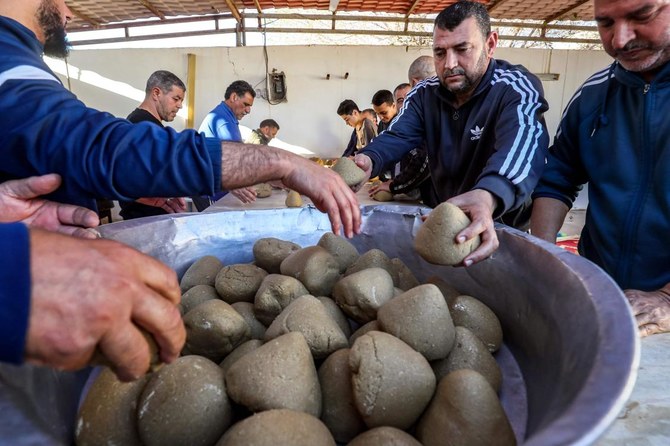
- Akin to Italian polenta or West African fufu, bazin, an originally Berber dish, is a classic family meal from Tripolitania
- It is also a symbol of sharing for Libyans, typically eaten by hand from a shared platter around which guests sit on the ground
Suspected Houthi missiles hit commercial ship in Red Sea
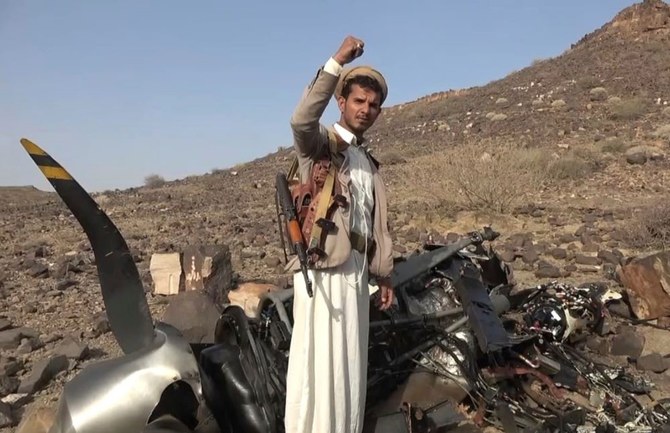
- US military destroys new barrage of militia drones
- CENTCOM says actions taken to protect freedom of navigation and make international waters safer
AL-MUKALLA: Missiles thought to have been fired by Houthi forces in Yemen targeted a commercial ship in the Red Sea on Monday as the US military destroyed a new barrage of Houthi drones.
UK Maritime Trade Operations said that it received an alarm about an explosion in the proximity of a commercial ship 87 km northwest of Yemen’s western town of Al-Mokha, but that the ship and the crew were safe.
“Vessels are advised to transit with caution and report any suspicious activity to (us),” UKMTO said on X.
Ambrey, a UK maritime security service, identified the target ship as a Malta-flagged cargo vessel that was hit by three missiles while travelling from Djibouti to the Gulf.
The Houthis did not immediately claim responsibility for Monday’s strike, although they often only take credit several hours, sometimes even days, after an attack.
Since November, the Iran-backed Houthis have seized one commercial ship, sunk another, and launched hundreds of drones, ballistic missiles, and remotely operated and explosives-laden boats at commercial and navy vessels in the Gulf of Aden, the Red Sea, and the Bab Al-Mandab Strait.
The Yemeni militia claims that the assaults are aimed only against Israel-bound and Israel-linked ships to push Israel to allow humanitarian supplies into the Gaza Strip.
In response to the Houthi’s ship campaign, the US formed a coalition of marine forces to protect critical maritime channels off Yemen and began strikes on Houthi-controlled areas of Yemen.
The US Central Command said that its forces on Sunday intercepted five drones launched by the Houthis over the Red Sea that were aimed at the US, its allies, and international commercial and naval ships.
“These actions are taken to protect freedom of navigation and make international waters safer and more secure for US coalition and merchant vessels,” CENTCOM said on X on Monday morning.
At the same time, the Houthi-run Saba news agency reported that the group’s armed forces carried out more than 83 strikes on 103 ships affiliated with Israel and its allies, as well as shooting down three US military MQ-9 Reaper drones between November 19, 2023, and April 26, 2024.
In a 39-page report on campaign against shipping in the Red Sea, the Houthis claimed that their strikes killed two American marines, two Filipinos, and one Vietnamese sailor while injuring four marines from the US-led marine task force.
During the campaign, the Houthis captured one ship, set fire to four, sunk two others, and damaged scores more, according to the report.
Despite a recent escalation in the number of strikes, since late last month the Houthis have drastically curtailed missile and drone attacks on ships.
The decrease in assaults has caused US military generals and analysts to surmise that the Houthis may have run out of weaponry and that the US-led air campaign reduced their military capabilities.
Jordan welcomes UK delegation to introduce weather forecasting project
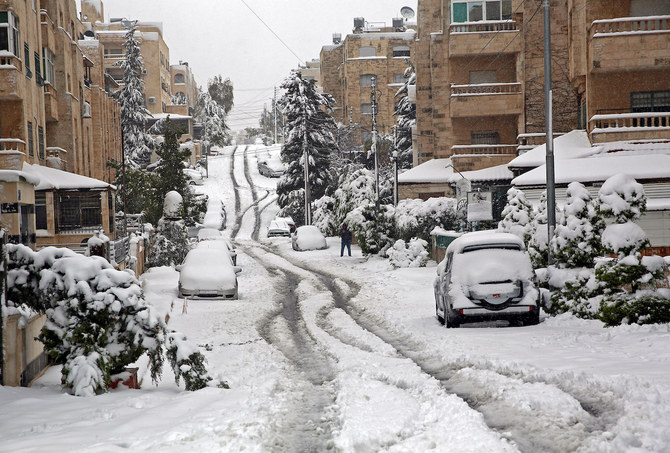
- Project aims to provide meteorological data and early warnings to refugee-hosting communities
AMMAN: Jordanian Transport Minister Wesam Altahtamouni welcomed a delegation from the British Embassy in Amman and the British Meteorological Office on Monday.
The meeting came as part of the UK Foreign Ministry’s efforts to implement the Jahez project, which aims to provide meteorological data and early warnings to refugee-hosting communities, Jordan News Agency reported.
Jahez, which will span three to five years, aims to develop proactive plans and long-term strategies, enhance monitoring and forecasting systems, and implement resilience-building measures to mitigate the effects of climate change.
The collaboration will involve Jordan’s ministries of transport, environment, planning, water and irrigation, as well as relevant municipalities.
Helen Ticehurst from the British Meteorological Office explained the British Meteorological Office’s operations and the objectives of Jahez.
The project also focuses on climate finance for countries hosting refugees.
Altahtamouni praised the British delegation for its willingness to provide technical assistance, leveraging the expertise of the British Meteorological Office in proactive weather forecasting and climate change adaptation.
Djibouti FM to stand at African Union Commission elections
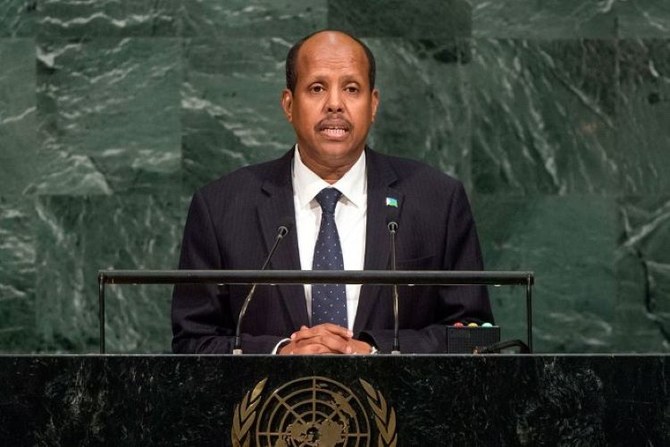
- Mahamoud Ali Youssouf calls for resolution of conflicts in Sudan, Gulf of Aden and Gaza
- Mahamoud Ali Youssouf: The only thing we know for sure today is that the next president will come from an East African country
RIYADH: Mahamoud Ali Youssouf, the minister of foreign affairs and international cooperation of the Republic of Djibouti, intends to stand for election to the African Union Commission.
The commission is based in Addis Ababa, Ethiopia. Its main functions are to represent the AU and defend its interests under the authority and mandate of the assembly and executive council.
The minister said that the main objectives of the commission are to promote integration, economic and social development, peace, security and human rights on the continent. It also aims to strengthen continental and international cooperation.
Tradition dictates that the president of the commission should be elected for a renewable four-year term, and should obviously be African, especially as the next session will be chaired by the East African Community, which includes Djibouti among its members.
The diplomat believes that winning these elections will contribute greatly to strengthening integration between the countries of the continent, as well as to reinforcing African relations with various other geographical groups, given the international and regional acceptance and respect enjoyed by Djibouti thanks to its balanced foreign policy.
Youssouf said he had been encouraged to stand as a candidate in the forthcoming elections by the respect and diplomatic appreciation that Djibouti possesses, highlighting also his long personal experience in the diplomatic field as an ambassador and then as minister of foreign affairs and international cooperation since 2005, and his in-depth knowledge of the work of the AU.
He said that a good knowledge of continental affairs is essential to occupy such an important position, adding that such an organization needs experienced leaders and diplomats to effectively promote continental and international cooperation given the continent’s current circumstances.
“The only thing we know for sure today is that the next president will come from an East African country. It will then be up to the member states to decide on the day of the vote,” he said.
Youssouf said that if elected, he will focus, in the interests of the African people, on three important areas: strengthening cooperation and economic integration between the countries of the continent; developing continental and international cooperation; and cooperation with international and regional organizations such as the UN, the Organization of Islamic Cooperation and the Arab League.
In early January, the Somaliland region signed an agreement with Ethiopia granting it a maritime opening to the Gulf of Aden. This treaty led to a political crisis between Ethiopia and neighboring Somalia, which promptly cancelled the memorandum, calling it illegal.
Youssouf said Djibouti currently chairs the Intergovernmental Authority on Development, and that Somalia and Ethiopia are members, along with other countries in the region, which gives it an additional responsibility in mediating between the two. He said that settlement efforts are continuing with Djibouti and Kenya mediating, with hopes that the two parties will reach an agreement soon.
He added that Djibouti, through its current presidency of IGAD, is very interested in seeing diplomatic relations between Somalia and Ethiopia return to what they were before the signing of the MoU.
Youssouf maintains that other crises in the world have distracted attention from Africa’s bloodiest conflict in Sudan, calling it the most forgotten crisis, especially when it comes to refugees and population displacement. He said that over 6.5 million Sudanese have been forced to leave their homes, with over a third of them displaced outside the country, and that the proliferation of ethnically-based militias in the current conflict is equally alarming.
As Sudan is a founding member of IGAD, he said Djibouti is making intense and continuous efforts in coordination with the other member states and the international community, notably the US and Saudi Arabia, to find a solution to the ongoing conflict in this brotherly country.
He also revealed that his country had already received representatives of the parties responsible for the crisis in Sudan to listen to their points of view and their vision for a solution. It should be noted that all have affirmed their desire to put an end to the war, and hope that these efforts will lead to a permanent and unconditional ceasefire, Youssouf said.
Recently, attacks on ships in the Red Sea have intensified, targeting vessels and disrupting this most important maritime passage. Youssouf said Djibouti is following these developments with great concern, specifying that the Bab Al-Mandeb Strait, overlooked by Djibouti, is considered an international passage of extreme importance from a political and economic point of view.
He confirmed that any breach of security in this area has global repercussions, given its role as a vital artery for international trade, and called for solutions to be found to the various crises in the region, so that everyone can enjoy peace and security.
With regard to the war on Gaza, Youssouf urged the international community to assume its responsibilities and put an end to the Israeli campaign which has cost the lives of over 34,000 people, as well as the resulting displacement and famine threatening the lives of millions of children.
Jordan nominates ancient Mehras olive trees for UNESCO Intangible Cultural Heritage list
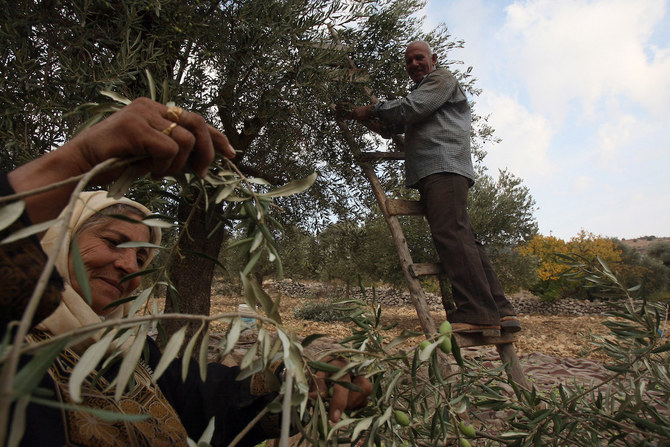
- Culture minister underscored the profound importance of the olive tree in Jordanian society
AMMAN: Jordan has nominated its Mehras olive trees for inclusion on UNESCO’s representative list of Intangible Cultural Heritage for the year 2025, Jordan News Agency reported on Monday.
According to the Food and Agricultural Organization, Jordan has some of the world’s most ancient habitats for olive trees.
Olive trees cover approximately 30 percent of all cultivated land in Jordan, constituting 75 percent of fruit trees. The olive trees hold immense significance for Jordan’s economy, environment, and culture.
Jordanian Culture Minister Haifa Najjar highlighted the importance of the tree to Jordanian heritage, drawing attention to its regional and international significance.
The minister underscored the profound importance of the olive tree in Jordanian society, representing both agricultural prowess and the cultural heritage deeply ingrained in the lives of its people.
She commended the collaborative efforts between the Ministry of Culture and national stakeholders in finalizing the nomination dossier for “The Ancient Olive Tree — Al-Mehras” to be presented to UNESCO in Paris.
Najjar noted the ministry’s commitment to documenting and safeguarding elements of intangible cultural heritage and the positive effect of such nominations on Jordan’s cultural presence globally.
The ministry previously secured UNESCO recognition for Jordanian cultural elements such as As-Samer traditional dance and mansaf, a traditional dish.
The ministry has participated in joint Arab nominations to UNESCO, highlighting the interconnectedness of cultural practices across the region. Previous submissions included files on date palm cultivation and Arabic calligraphy.
Looking ahead, Najjar mentioned joint Arab nominations currently under consideration for the 2025 UNESCO list. These encompass an array of practices and traditions, including mud architecture, traditional attire for men, musical instruments such as the oud, and various crafts and skills associated with Arab cultural heritage.
Dubai launches major AI economic strategy
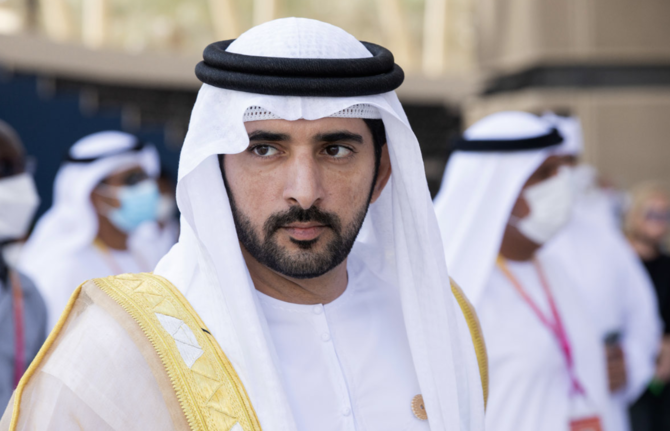
- Crown prince said initial phase of plan, by leveraging AI, would enhance quality of life and well-being for Dubai residents
RIYADH: Dubai’s crown prince on Monday launched a major artificial intelligence drive across government, business and education in the emirate.
The Dubai Universal Blueprint for Artificial Intelligence aims to achieve the Dubai Economic Agenda D33 — to double the size of the economy by 2033 — by adding AED100 billion ($27 billion) from digital transformation and increasing economic productivity by 50 percent.
The strategy includes appointing chief Al officers in government entities, the launch of a Dubai AI and Web3 campus, the launch of AI weeks at the emirate’s schools, a plan to attract data centers and the launch of a trade license for AI.
Sheikh Hamdan bin Mohammed Al-Maktoum said that the initial phase of the plan, by leveraging AI, would enhance quality of life and well-being for Dubai residents.
“Dedicated incubators and campuses for artificial intelligence will be launched to further enhance Dubai’s vibrant AI ecosystem, and finally AI will be celebrated in Dubai schools with the introduction of an AI week,” he said on X.
“We will annually review, update and introduce new projects under this plan, ensuring it keeps pace with all developments. Dubai is a city centered around its people, and to this end, we will dedicate all our resources and energy to make it the happiest place in the world.”
The crown prince said: “In 1999, his highness Sheikh Mohammed bin Rashid Al-Maktoum initiated the pioneering journey of the future by launching Dubai’s digital transformation, a venture that has continued to achieve milestones, leading to the recent unveiling of the Dubai Digital Strategy last year.
“We have realized record-breaking accomplishments that have established us as the premier hub for billion-dollar global enterprises in the technology and artificial intelligence sectors within the region,” he added.
Sheikh Hamdan said that the evolution of AI is presenting opportunities for nations and governments, but posing challenges to those unable to keep pace.
For Dubai, this requires a “swift and adaptive action plan,” responding to the “rapid changes in technology and AI,” he added.






